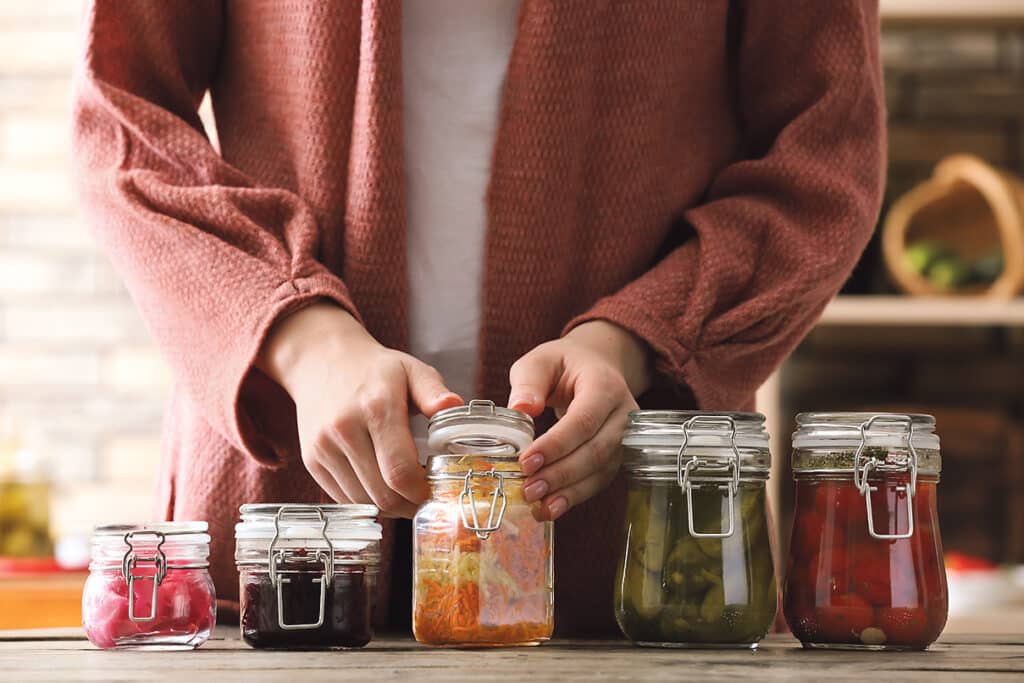
It is wonderful see the young seedlings that were sown a few weeks ago beginning to appear over the ground. The first leaves of lettuce, chard, and other salad plants remind us of sunny summer days, lighter food, and outdoor dining. However, this is also the time to think of the winter and with the real possibility of food insecurity in the coming months, more thought may need to be given to foods that we can harvest and keep over this season. One of the best ways to keep foods, without adding them to the freezer, is by fermentation. Even today this method of preserving food remains a simple natural way to extend the life of produce without the need for added preservatives. We are familiar with sauerkraut and kimchi, but it is also possible to ferment other assorted vegetables.
Man has been fermenting foods since neolithic times and fermentation is akin to alchemy because given the right conditions, simple ingredients come together and undergo a transformation to become something entirely different and new. When microorganisms, known as the starter, are introduced to the carbohydrates in food and kept under certain conditions for an extended period, fermentation takes place. Fermented foods are rich in probiotics and high in enzymes. They are also highly bioavailable and offer excellent digestive support in that they balance the gut flora and improve digestion generally.
If we look at sauerkraut alone we find it creates good bacteria in the gut, aids digestion and boosts the immune system. As well as these benefits, it contains vitamin A, vitamin C, vitamin K, as well as being high in fibre and rich in probiotics. When cabbage and salt are combined and massaged together to create a brine, the naturally occurring bacteria present in the cabbage creates sauerkraut. Who would ever think a cabbage could be so good for you, and what a pleasant change from boiling it to death with bacon.
Good, fermented food starts with high quality ingredients: As a rule always buy ingredients that are organically grown or, better again, use produce from your own garden. Fermentation takes place at room temperature and there is a better chance of success if the ambient temperature is kept within the optimal range of 65-75 degrees farenheit or 18-24 degrees centigrade. Fermenting below the ideal range can result in the microorganisms becoming dormant, while fermenting above the active range can kill the beneficial microorganisms. Once the fermentation is complete, the finished product is best stored in the ‘fridge.
Clear glass Kilner jars are the ideal vessel for many types of fermenting because it’s easy to see the contents and to track the progress of the fermentation. They’re available in most shops, come in a variety of standard sizes and are also easier to clean and sterilise. The only problem with them is that they’re fragile since glass breaks easily. When fermenting food for longer than one week use plastic lids or inserts for the Kilner jar because the steel lids can begin to rust when exposed to the salt and the acids of fermentation for any extended period of time. The other problem with glass Kilner jars is that light can interfere with the fermentation process so it is best to keep the fermenting foods in a dark place especially those that are particularly light sensitive. It is very easy to cover a Kilner jar with a cloth or paper to keep the light away from the process.
A starter is the culture that can cause fermentation. In some foods such as vegetables the starter necessary for fermentation is already present and all that’s required is placing the food in the right environment for fermentation to take place. For other ferments, such as kombucha, the starter must be intentionally produced.
Cabbage is the most popular vegetable for fermenting, but carrots come a close second. Other vegetables that are suitable include, celeriac, kohlrabi, parsnips, winter radish, Jerusalem artichokes, and swede turnips.
Salt is needed for fermentation for several reasons. Firstly, it neutralises the pathogenic microorganisms, and allows good bacteria to establish themselves before the bad ones. Secondly salt helps to draw water out of vegetables, and this creates a natural brine full of nutrients for the microorganisms. This brine also covers the vegetables and prevents exposure to oxygen thus creating the perfect environment for fermentation. Thirdly, salt slows down the softening of vegetables. The more salt you add the slower for the fermentation and the longer the vegetables will remain crisp and finally salt makes fermented food taste good.
The salt used must have no additives so pickling salt, sea salt or any salt that is JUST salt can be used. Salt can be added to fermentations in two ways, either dry salting or a brine. In both cases the amount of salt is the same, namely two per cent. For 1000grm of vegetables this is 20 grams. In dry salting the vegetables are chopped or sliced into small pieces and the salt is massaged into them. This allows the salt to draw the water out of the vegetables thus creating a natural brine. The vegetables are then packed tightly into a jar where the brine should cover the vegetables. This is the method used for sauerkraut.
For vegetables that do not have a high water content use a brine. The calculation for the amount of salt is made by the size of the jar in which you are placing the vegetables. If the jar is one litre, the amount of salt is two per cent, which again is 20 grams. In this instance, you add the chopped vegetables and salt to the jar and then pour one litre of water over them. Shake the jar well to dissolve the salt.
Fermentation then is one method of preserving food for the winter with the added addition of it being extremely good for us and maintaining our health.



